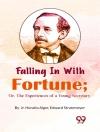Edward Bellamy’s ’A Positive Romance’ is a speculative work that intertwines elements of utopian fiction with a profound exploration of social and economic issues. Set against the backdrop of a transformed America, where a cooperative society prevails, the novel utilizes a didactic tone to navigate complex themes such as technological advancement, individualism, and collective welfare. The narrative is infused with a deep sense of optimism about the potential for societal change, a hallmark of Bellamy’s literary style, reflecting the zeitgeist of the late 19th century when industrialization prompted critical reexamination of capitalism and social justice. Edward Bellamy, an influential figure in American literature and political thought, was deeply affected by the economic disparities of his time. His experiences amid the socio-political upheavals of the Gilded Age catalyzed his vision for a progressive future, inspiring both his fiction and his essays. ’A Positive Romance’ can be seen as part of his broader project to imagine and advocate for a fairer and more equitable society, building on the ideas presented in his seminal work, ’Looking Backward.’ This book is a must-read for anyone interested in the intersection of romance and socio-political commentary, as it engages readers with its imaginative vision and encourages contemplation of a future grounded in cooperation and mutual benefit. Bellamy’s thought-provoking narrative serves as both a reflection and a challenge to contemporary societal norms, making it an essential addition to the repertoire of utopian literature.
Om författaren
Edward Bellamy (1850–1898) was a visionary American author chiefly known for his utopian novel ’Looking Backward: 2000-1887’ (1888), which captured the imagination of his contemporaries and inspired a popular movement known as Nationalism. Less widely acknowledged but equally pertinent is ’A Positive Romance’ (1898), a work showcasing his adeptness with shorter fiction. Bellamy’s literary style is marked by a clear, direct prose aimed at elucidating the social and political concerns of his age, notably the tensions wrought by industrial capitalism and the possibility of an alternative, more equitable society. Born in Chicopee Falls, Massachusetts, Bellamy pursued law before focusing on journalism and literature. His short story ’A Positive Romance’ typifies his interest in the lives of ordinary people and the potential for human connection to transcend economic barriers. While Bellamy’s literature was rooted in the pressing issues of his time, his optimism and prescient depictions of future societies keep his work relevant and instigative in contemporary literary discourse. His ideas continued to influence thinkers and writers long after his death, provoking thought about the societal structures we accept as inescapable and the potential for their reform or replacement.












